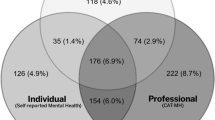Abstract
Background
Research on lay public’s attitudes toward the treatment of mental disorders is receiving increasing scientific attention. Most of the surveys on lay public attitudes have used rating approaches. However, in daily life, people are forced to make decisions. Therefore, we used a ranking approach to elucidate preferences of the lay public, aiming to reflect the real life decision-making process.
Objective
We investigated preferences of the lay public regarding sources of help and treatment options in case of mental disorder.
Methods
In the spring of 2001, a representative survey was carried out in Germany (n=5015). A personal fully structured interview was conducted which started with the presentation of a vignette depicting someone with either schizophrenia or major depression. Respondents were asked to make first and second choices regarding the recommendation of source of help and treatment. Furthermore, socio-demographic characteristics and illness behaviour as possible determinants were assessed and analysed using logistic regression.
Results
Even though most of the people advise professional help, especially from mental health professionals, a large gap remains between evidence-based treatment strategies and public opinion. Psychotherapy is by far the most favoured treatment. In contrast, psychotropic drug treatment was only suggested by the minority for first-choice treatment. Certain beliefs concerning illness and socio-demographic characteristics are associated with specific recommendations regarding source of help and treatment.
Conclusion
The consequences are twofold. First, as mental health professionals are dealing with non-compliance especially to psychotropic drugs, they have to realise that basic beliefs and expectations may play a more prominent role than has been previously assumed. Consequently, they have to put far more effort into what is called psychoeducation. Secondly, public knowledge about mental disorders and their treatment strategies has to be enhanced by working with the mass media and looking for other tailored interventions.
Similar content being viewed by others
References
Ajzen I (1991) The theory of planned behavior. Org Behav Hum Decision Proc 50:179–211
Althaus D, Stefanek J, Hasford J, Hegerl U (2002) Knowledge and attitude of the general public regarding symptoms, etiology and possible treatments of depressive illnesses. Nervenarzt 73:659–664
Angermeyer MC, Matschinger H (1996) The effect of personal experience with mental illness on the attitude towards individuals suffering from mental disorders. Soc Psychiatry Psychiatr Epidemiol 31:321–326
Angermeyer MC, Matschinger H, Riedel-Heller SG (2001) What to do about mental disorder–help-seeking recommendations of the lay public. Acta Psychiatr Scand 103:220–225
Angermeyer MC, Matschinger H, Riedel-Heller SG (1999) Whom to ask for help in case of a mental disorder? Preferences of the lay public. Soc Psychiatry Psychiatr Epidemiol 34:202–210
Angermeyer MC, Schulze B (2001) Reinforcing stereotypes: how the focus on forensic cases in news reporting may influence public attitudes towards the mentally ill. Int J Law Psychiatry 24:469–486
Bauer M, Kunze H, Von Cranach M, Fritze J, Becker T (2001) Psychiatric reform in Germany. Acta Psychiatr Scand 410(Suppl):27–34
Dietrich S, Beck M, Bujantugs B, Kenzine D, Matschinger H, Angermeyer MC (2004) The relationship between public causal beliefs and social distance toward mentally ill people. Aust N Z J Psychiatry 38:348–354
Hoffmann-Richter U, Forrer F, Finzen A (2003) Schizophrenia in the German national paper Frankfurter Allgemeine Zeitung—a didactic play. Psychiatr Prax 30:4–7
Inglehardt R (1998) Die Untersuchung der Wertprioritäten: Ranking-Verfahren versus Rating-Verfahren. In: Inglehart R (ed) Modernisierung und Postmodernisierung.Campus, Frankfurt, pp 166–178
Jorm AF, Korten AE, Jacomb PA, Christensen H, Rodgers B, Pollitt P (1997a) “Mental health literacy”: a survey of the public’s ability to recognise mental disorders and their beliefs about the effectiveness of treatment. Med J Aust 166:182–186
Jorm AF, Angermeyer M, Katschnig H (2000) Public knowledge of and attitudes to mental disorders: a limiting factor in the optimal use of treatment services. In: Andrews G, Henderson S (eds) Unmet need in mental health service delivery. Cambridge University press, Cambridge, pp 399–413
Kitchener BA, Jorm AF (2002) Mental health first aid training for the public: evaluation of effects on knowledge, attitudes and helping behavior. BMC Psychiatry 2:10
Lauber C, Nordt C, Falcato L, Rössler W (2001) Lay recommendations on how to treat mental disorders. Soc Psychiatry Psychiatr Epidemiol 36:553–556
Priest RG, Vize C, Roberts A, Roberts M, Tylee A (1996) Lay people’s attitudes to treatment of depression: results of opinion poll for Defeat Depression Campaign just before its launch. BMJ 313:858–859
Schulze B, Richter-Werling M, Matschinger H, Angermeyer MC (2003) Crazy? So what! Effects of a school project on students’ attitudes towards people with schizophrenia. Acta Psychiatr Scand 107:142–150
Ying YW (1990) Explanatory models of major depression and implications for help-seeking among immigrant Chinese-American women. Cult Med Psychiatry 14:393–408
Author information
Authors and Affiliations
Corresponding author
Rights and permissions
About this article
Cite this article
Riedel-Heller, S.G., Matschinger, H. & Angermeyer, M.C. Mental disorders—who and what might help?. Soc Psychiatry Psychiatr Epidemiol 40, 167–174 (2005). https://doi.org/10.1007/s00127-005-0863-8
Accepted:
Issue Date:
DOI: https://doi.org/10.1007/s00127-005-0863-8



